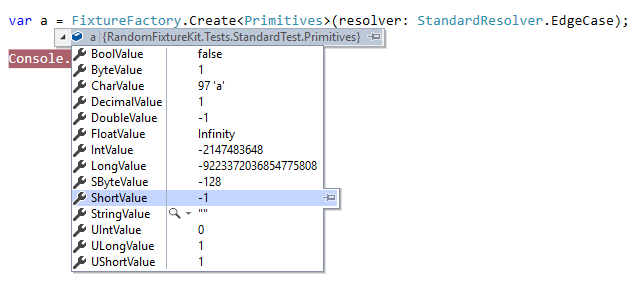Awesome
RandomFixtureKit
Fill random/edge-case value to target type for unit testing, supports both .NET Standard and Unity. This lib is similar as AutoFixture but has some different things.

NuGet: RandomFixtureKit
Install-Package RandomFixturekit
Unity: releases/RandomFixtureKit.unitypackage
or package.json exists on src/RandomFixtureKit.Unity/Assets/Scripts/RandomFixtureKit for unity package manager.
Table of Contents
<!-- END doctoc generated TOC please keep comment here to allow auto update -->How to use
// get single value
var value = FixtureFactory.Create<Foo>();
// get array
var values = FixtureFactory.CreateMany<Bar>();
// get temporal value(you can use this values to use invoke target method)
var (x, y, z) = FixtureFactory.Create<(int, string, short)>();
In the default, all fill values are random(and not includes null). This behaviour is configure by IGeneratorResolver resolver overload.
// default is NotNull resolver, the value is completely random
var value1 = FixtureFactory.Create<int>(resolver: StandardResolver.NotNull);
// you can change the EdgeCaseResolver,
var value2 = FixtureFactory.Create<int>(resolver: StandardResolver.EdgeCase);
// you can change the default resolver.
FixtureFactory.Default = StandardResolver.EdgeCase;
// or make the new you combine resolver.
// this configuration uses string => fill Japanese Hiragana and others as NonNullResolver
var resolver = new CompositeResolver(new[] {
new JapaneseHiraganaGenerator(stringLength:9),
}, new[] {
StandardResolver.NonNull
});
// for fill interface type, need to map before call create
FixtureFactory.RegisterMap<IFoo, Foo>();
var v = FixtureFactory.Create<IFoo>(); // return Foo object

edge-case, for example int is filled int.MinValue, int.MaxValue, 0, -1 or 1. collection(array, list, etc...) is filled null, zero-elements, one-elements, nine-elements.
Custom Generator
Implement IGenerator and setup composite-resolver, you can control how generate values.
// for example, increment Id on create MyClass value.
public class MyClass
{
public int Id { get; set; }
public int Age { get; set; }
public string Name { get; set; }
public override string ToString()
{
return (Id, Age, Name).ToString();
}
}
// Create IGenerator.
public class MyClassSequentialIdGenerator : IGenerator
{
int sequence = 0;
IGenerator fallbackGenerator = new Int32Generator();
// this generator called if requires int value.
public Type Type => typeof(int);
public object Generate(in GenerationContext context)
{
// check target int field belongs MyClass.
if (context.FieldInfo != null)
{
// auto-implemented property's field: <Id>k__BackingField
if (context.FieldInfo.DeclaringType == typeof(MyClass) && context.FieldInfo.Name.StartsWith("<Id>"))
{
return (sequence++);
}
}
return fallbackGenerator.Generate(context);
}
}
// setup generator to use
var resolver = new CompositeResolver(new[] { new MyClassSequentialIdGenerator() }, new[] { StandardResolver.NonNull });
var fixture = new Fixture(resolver); // fixture is instance version of FixtureFactory
var foo = fixture.CreateMany<MyClass>(100);
foreach (var item in foo)
{
Console.WriteLine(item);
}
Author Info
This library is mainly developed by Yoshifumi Kawai(a.k.a. neuecc).
He is the CEO/CTO of Cysharp which is a subsidiary of Cygames.
He is awarding Microsoft MVP for Developer Technologies(C#) since 2011.
He is known as the creator of UniRx and MessagePack for C#.
License
This library is under the MIT License.
